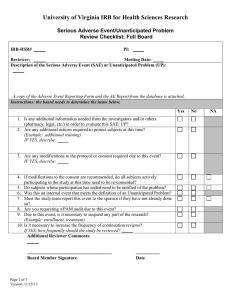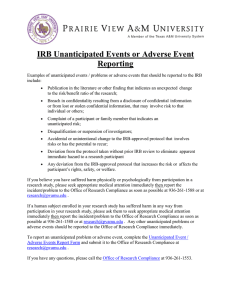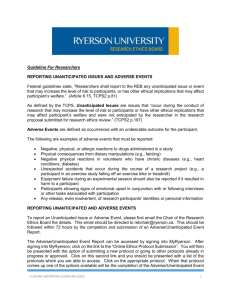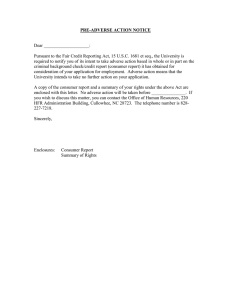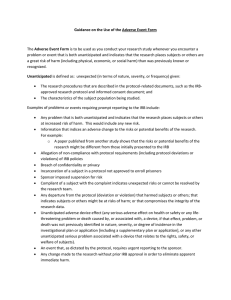Form for Reporting Adverse Events or Unanticipated Problems (DOC)
advertisement
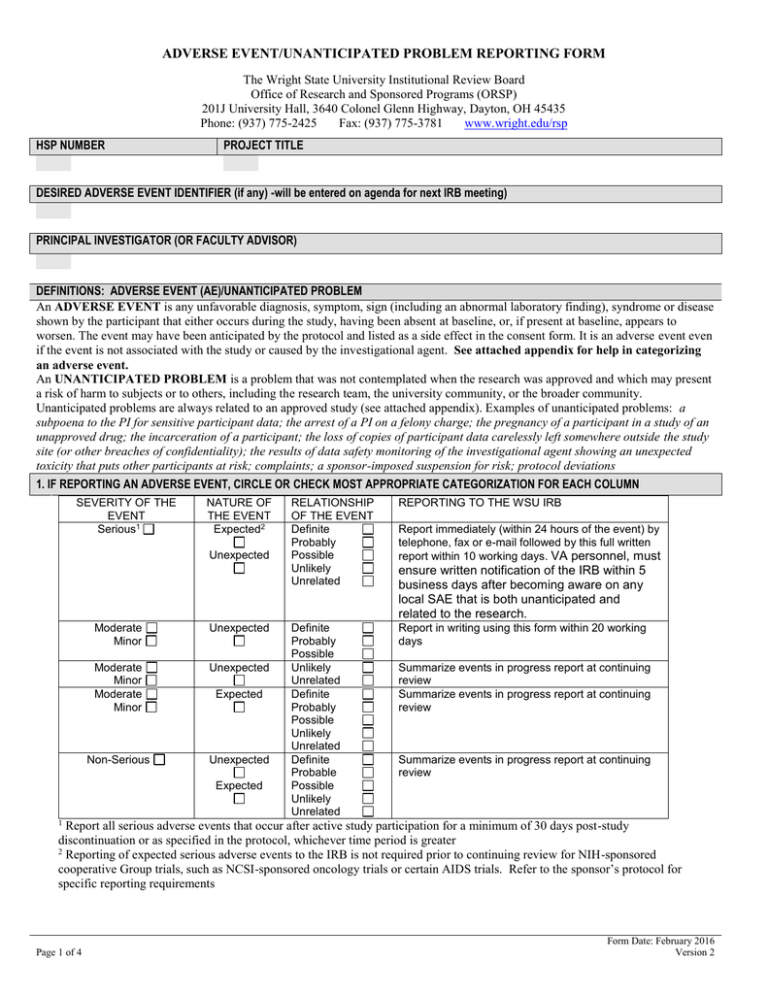
ADVERSE EVENT/UNANTICIPATED PROBLEM REPORTING FORM The Wright State University Institutional Review Board Office of Research and Sponsored Programs (ORSP) 201J University Hall, 3640 Colonel Glenn Highway, Dayton, OH 45435 Phone: (937) 775-2425 Fax: (937) 775-3781 www.wright.edu/rsp HSP NUMBER PROJECT TITLE DESIRED ADVERSE EVENT IDENTIFIER (if any) -will be entered on agenda for next IRB meeting) PRINCIPAL INVESTIGATOR (OR FACULTY ADVISOR) DEFINITIONS: ADVERSE EVENT (AE)/UNANTICIPATED PROBLEM An ADVERSE EVENT is any unfavorable diagnosis, symptom, sign (including an abnormal laboratory finding), syndrome or disease shown by the participant that either occurs during the study, having been absent at baseline, or, if present at baseline, appears to worsen. The event may have been anticipated by the protocol and listed as a side effect in the consent form. It is an adverse event even if the event is not associated with the study or caused by the investigational agent. See attached appendix for help in categorizing an adverse event. An UNANTICIPATED PROBLEM is a problem that was not contemplated when the research was approved and which may present a risk of harm to subjects or to others, including the research team, the university community, or the broader community. Unanticipated problems are always related to an approved study (see attached appendix). Examples of unanticipated problems: a subpoena to the PI for sensitive participant data; the arrest of a PI on a felony charge; the pregnancy of a participant in a study of an unapproved drug; the incarceration of a participant; the loss of copies of participant data carelessly left somewhere outside the study site (or other breaches of confidentiality); the results of data safety monitoring of the investigational agent showing an unexpected toxicity that puts other participants at risk; complaints; a sponsor-imposed suspension for risk; protocol deviations 1. IF REPORTING AN ADVERSE EVENT, CIRCLE OR CHECK MOST APPROPRIATE CATEGORIZATION FOR EACH COLUMN SEVERITY OF THE EVENT Serious1 NATURE OF THE EVENT Expected2 Unexpected Moderate Minor Unexpected Moderate Minor Moderate Minor Unexpected Non-Serious Unexpected Expected Expected RELATIONSHIP OF THE EVENT Definite Probably Possible Unlikely Unrelated REPORTING TO THE WSU IRB Definite Probably Possible Unlikely Unrelated Definite Probably Possible Unlikely Unrelated Definite Probable Possible Unlikely Unrelated Report in writing using this form within 20 working days Report immediately (within 24 hours of the event) by telephone, fax or e-mail followed by this full written report within 10 working days. VA personnel, must ensure written notification of the IRB within 5 business days after becoming aware on any local SAE that is both unanticipated and related to the research. Summarize events in progress report at continuing review Summarize events in progress report at continuing review Summarize events in progress report at continuing review 1 Report all serious adverse events that occur after active study participation for a minimum of 30 days post-study discontinuation or as specified in the protocol, whichever time period is greater 2 Reporting of expected serious adverse events to the IRB is not required prior to continuing review for NIH-sponsored cooperative Group trials, such as NCSI-sponsored oncology trials or certain AIDS trials. Refer to the sponsor’s protocol for specific reporting requirements Page 1 of 4 Form Date: February 2016 Version 2 The Wright State University IRBs – EVENT REPORTING FORM FOR UNANTICIPATED PROBLEMS, ADVERSE EVENTS, ETC. 2. DESCRIPTION OF THE ADVERSE EVENT OR UNANTICIPATED PROBLEM Describe (or attach a detailed description of) the event or problem being reported. Attach additional documents as necessary. Include information on any harm incurred by the subject(s), and the current condition of the subject(s) (if known). Indicate if the event or a similar event has occurred previously, or if this is the first occurrence. Do not include participants’ personally identifiable information. 3. IF REPORTING AN UNANTICIPATED PROBLEM, DESCRIBE THE STEPS TAKEN TO INSURE THAT THE PROBLEM WILL NOT REOCCUR Describe steps that were taken to prevent reoccurrence (e.g. training of staff, revision of protocols etc.) Attach additional documents as necessary. 4. IF REPORTING AN UNANTICIPATED PROBLEM, EVALUATE IF THE PROBLEM RESULTED IN INCREASED RISK TO THE SUBJECTS OR OTHERS Yes State whether the reported event or information represents an unanticipated problem involving risks to subjects or others? No Explain why or why not: 5. SOURCE OF THE REPORT Internal (research conducted at WSU or its affiliate locations) Other If Other, list the location where the research was performed and/or the event occurred. 6. DATE(S) OF THE ADVERSE EVENT OR UNANTICIPATED PROBLEM 7. RESEARCH STATUS a. The research participant(s) involved is/are: Still on study No longer on study N/A or unknown 8. OTHER REPORTING The adverse event or problem will also be reported to (check all that apply): Institutional Official OHRP Sponsor Other – Specify: Signature of Principal Investigator (or Advisor) Page 2 of 4 Date Form Date: February 2016 Version 2 The Wright State University IRBs – EVENT REPORTING FORM FOR UNANTICIPATED PROBLEMS, ADVERSE EVENTS, ETC. DEFINITIONS Adverse events: Any unfavorable diagnosis, symptom, sign (including an abnormal laboratory finding), syndrome or disease shown by the participant which either occurs during the study, having been absent at baseline, or, if present at baseline, appears to worsen. The event may have been anticipated by the protocol and listed as a side effect in the consent form. It is an adverse event even if the event is not associated with the study or caused by the investigational agent. Severity of the Event: Serious adverse events - Any untoward medical occurrences that: (1) result in death, (2) are life threatening, (3) require inpatient hospitalization or prolongation of existing hospitalization, (4) cause serious, persistent or significant disability or incapacity, (5) result in a congenital anomaly or birth defect, or (6) causes cancer, or (7) results in an overdose of the investigational drug or (8) is any medical event that requires treatment to prevent one of the medical outcomes listed above. Non-Serious Adverse Event: An adverse event which appears not to have harmed or have the potential to harm participants. The Adverse Event may or may not have been contemplated and listed as a side effect in the Informed Consent document. Nature of the Event: Expected Adverse Events - Adverse events described in the Package Insert on FDA approved drugs, biologics or devices; adverse events described in the FDA Investigator's Brochure/Device Description for investigational drugs, biologics or devices. Unexpected Adverse Events - An event is unexpected when the event or its severity are not accurately reflected in the informed consent document. Relationship of Adverse Event to Study Drug or Procedure Adverse events may be related (are or may have been caused by the study drug or procedure) or unrelated (clearly due to extraneous causes (e.g., underlying disease, environment) to the study drug or procedure). The following criteria may be used to determine the likelihood that an adverse event is related to the study drug or procedure: Unlikely (must have 2): 1) does not have temporal relationship to intervention, 2) could readily have been produced by the subject's clinical state, 3) could have been due to environmental or other interventions, 4) does not follow known pattern of response to intervention, 5) does not reappear or worsen with reintroduction of intervention Possibly Related (must have 2): 1) has a reasonable temporal relationship to intervention, 2) could not readily have been produced by the subject's clinical state, 3) could not readily have been due to environmental or other interventions, 4) follows a known pattern of response to intervention Page 3 of 4 Form Date: February 2016 Version 2 The Wright State University IRBs – EVENT REPORTING FORM FOR UNANTICIPATED PROBLEMS, ADVERSE EVENTS, ETC. Probably Related (must have 3): 1) has a reasonable temporal relationship to intervention, 2) could not readily have been produced by the subject's clinical state or have been due to environmental or other interventions, 3) follows a known pattern of response to intervention, 4) disappears or decreases with reduction in dose or cessation of intervention Definitely Related (must have all 4): 1) has a reasonable temporal relationship to intervention; 2) could not readily have been produced by the subject's clinical state or have been due to environmental or other interventions; 3) follows a known pattern of response to intervention; 4) disappears or decreases with reduction in dose or cessation of intervention and recurs with re-exposure. Unanticipated Problem – An problems which were not contemplated when the research was approved and which present risk of harm to subjects or to others, including the research team, the university community, or the broader community. Unanticipated problems are always related to an approved study, either ongoing or closed. Examples of Unanticipated Problems that present the risk of serious harm to participants and must be reported to the IRB are: subpoena to the PI for sensitive participant data; the arrest of a PI on a felony charge; the pregnancy of a participant in a study of an unapproved drug; the incarceration of a participant the loss of copies of participant data carelessly left somewhere outside the study site (or other breaches of confidentiality); the results of data safety monitoring of the investigational agent showing an unexpected toxicity that puts other participants at risk. complaints sponsor-imposed suspension for risk protocol deviations (see below for definition) Definition of protocol deviation – Any unapproved deviation from the protocol, including deviations from eligibility criteria or patient visits outside the time specified in the protocol. A significant protocol deviation is an unapproved deviation from the protocol that significantly affects the safety of the subject, the scientific quality of the study, or the safety of researchers. Dayton VA Research When a VA employee becomes aware of an unanticipated, related and local death they must ensure immediate oral notification of the IRB and written notification within 5 business days. When a VA employee becomes aware of an unanticipated, related and local serious adverse event they must ensure written notification of the IRB within 5 business days. Page 4 of 4 Form Date: February 2016 Version 2
